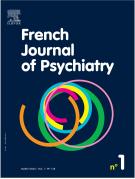Can anhedonia and anxiety predict depression outcome - a connectivity study in diffusion tensor imaging - 29/05/20
Résumé |
Introduction |
Depression is a frequent, recurrent and disabling illness. Presently, we lack of efficient treatments, encouraging neuroscientific research to better understand how physiopathology mechanisms are responsible for depression outcome. Anxiety and anhedonia are two semiological dimensions strongly linked to depression, but those clinical features alone do not seem sufficient to predict depression evolution. This is why we aim to explore how anxiety and anhedonia's diffusion-related features can predict depression outcome and offer a supplementary insight in the physiopathology of non-responding depression.
Methods |
A population of 74 depressive patients were recruited from psychiatric routine care of Guillaume-Régnier Hospital in Rennes, France. All included patients had an MRI with diffusion tensor imaging sequences (DTI). Several scales were carried out, particularly to measure anhedonia and anxiety. A priori regions of interest were selected among the habenular system, a network strongly connected to depression, anhedonia and anxiety: the amygdala, the locus coeruleus, the dorsal and median raphe, the periaqueductal grey, the ventral tegmental area, the nucleus accumbens, the precuneus, the insula, the anterior cingulate cortex, the orbito-frontal cortex, and the habenula itself. Using FSL, masks for those regions in the right and left cerebral hemispheres were created and DTI metrics were extracted: fractional anisotropy, apparent diffusion coefficient, axial and radial diffusivity.
Results |
The study population is predominantly composed of middle-aged females with severe course of chronic illness (50% of patients over 5.3 episodes) and high anxiety (75% with STAI-A and B scores over 52.0, threshold for anxiety). Anhedonia and anxiety are linked to one another using a univariate linear regression model (to the HAM-A with a P<0.05 and to the STAI-A with a P<0.01). In a multivariate logistic regression analysis, anhedonia and modifications of diffusion-related features in the right insula are found to be predictive of the treatment response in depression (P<0.05).
Conclusion |
This study highlights how anhedonia constitutes a crucial symptom in non-responsive depression and how the insula appears to be a fundamental structure in understanding its physiopathology. It supports the idea of persevering to identify a combination of clinical and radiological risks factors to increase prediction of depression outcome.
Le texte complet de cet article est disponible en PDF.Keywords : Anhedonia, Depression, Prediction, DTI, Insula
Plan
Vol 1 - N° S2
P. S122 - décembre 2019 Retour au numéroBienvenue sur EM-consulte, la référence des professionnels de santé.
L’accès au texte intégral de cet article nécessite un abonnement.
Déjà abonné à cette revue ?


